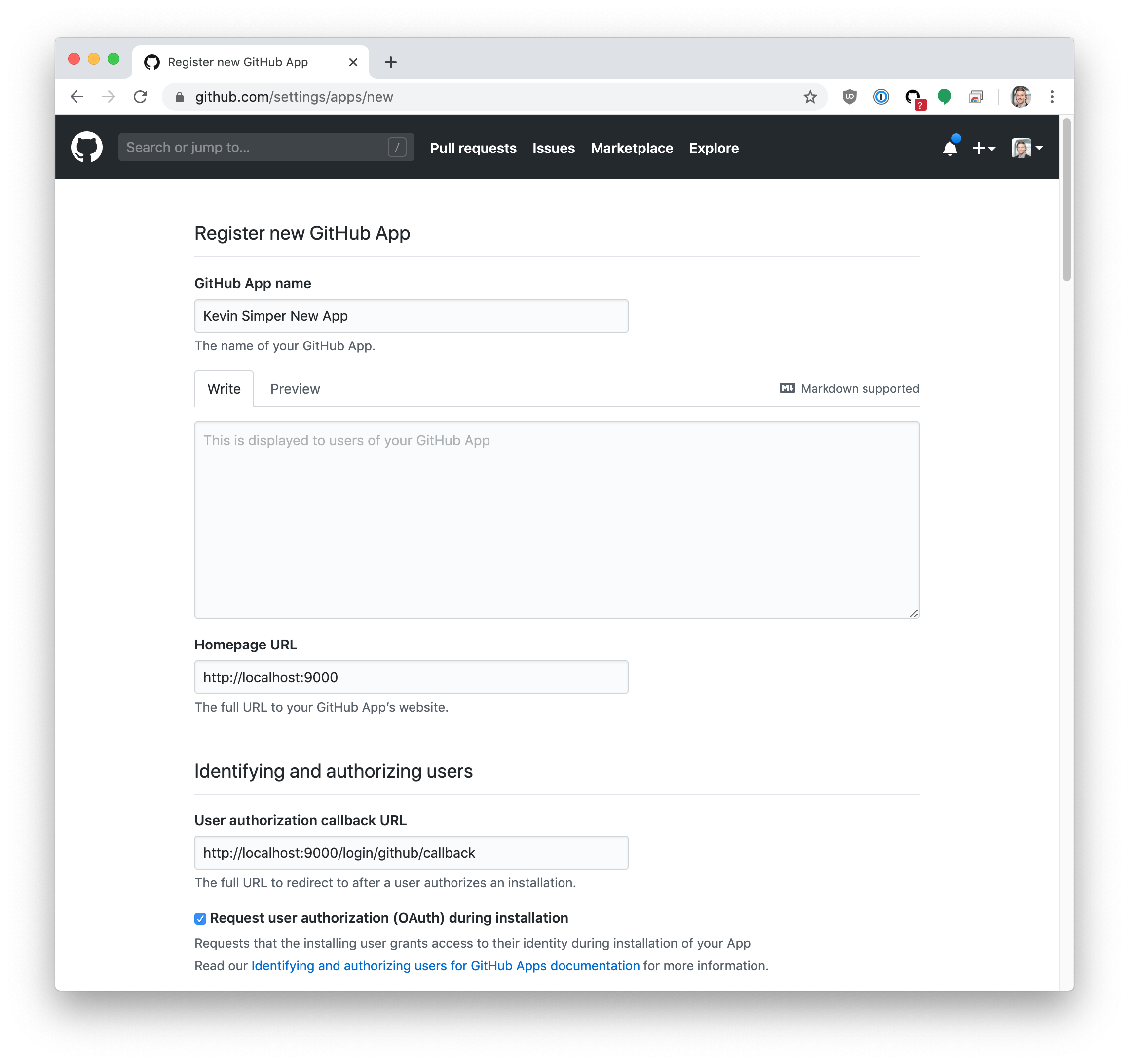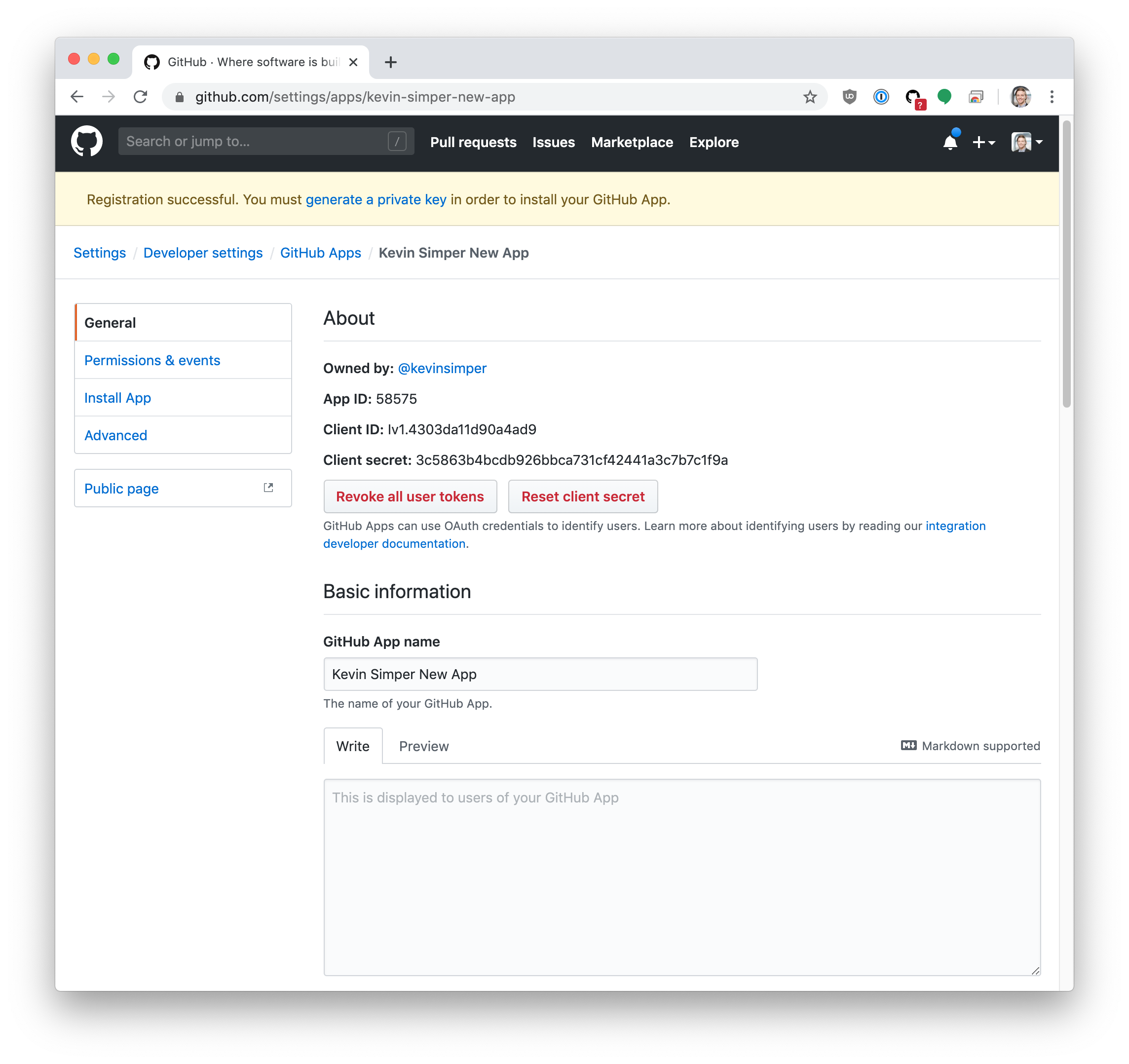How to make authentication with Github Apps for side projects
Making a secure way to log into your app can be difficult. On top of making login secure you have to implement a lot of other features like "forgot password" and 2-factor. These features are essential but do not bring/add that much value, so why not leverage other platforms that already implemented all this.
I want to encourage doing this for side projects specially since writing and maintaining auth and authorization as the code in this example is very small once you know how. Doing it with GitHub is also useful if your audience is developers as they likely already have an account.
GitHub also introduced "GitHub Apps", which is their improved platform that allows better permissions compared to the previous which had really broad permissions.
How does it work?
We need to know who a user is. We want to ask GitHub to ask the user if they want to forward their information to us. So the user starts on our website, they click "Login with GitHub" and we redirect them to github.com with 2 parameters:
- the unique id of our GitHub app
- the url the user should be redirected back to
In our GitHub app, we have already configured that we want read-only access to the user's email.
The user is then greeted with a page that asks if they want to give us the information. When they do they are redirected back to our website with a short code in the URL. That short code string we can exchange for an api access token by sending it to the GitHub api together with our client id and client secret.
With the access token, we can fetch all the data from the api, like the user's email and their GitHub user id that we can save to our database to know who they are next time they log in.
Example with Node.js
Let us create a small Node.js example app.
Creating your first GitHub app
We first need to create a GitHub App, that can be done here:
https://github.com/settings/apps
You need to fill out name, homepage url. You can deactivate the Webhook by unticking the Webhook.
In the homepage url you can put in "http://localhost:9000" which we are going to use when developing locally.
Fill it out like this:

Creating the node.js server
Ensure that you have Node.js installed and create a new folder on your computer.
We are going to use Express.js as it allows use some convenience with routing and redirects.
$ npm init -y
$ npm install express esm
and we can create a server.js
import express from 'express'
const app = express()
app.get('/', (req, res) => {
res.send('Hello GitHub auth')
})
const PORT = process.env.PORT || 9000
app.listen(PORT, () => console.log('Listening on localhost:' + PORT))
Open package.json and add a new script to start the server
"scripts": {
"start": "node -r esm server.js"
}
We are using esm to use new ESNext import , which also works nicely with TypeScript if we want to convert it.
Saving GitHub App credentials
We need to take the client id and client secret and store it in a way we can use it in our application.

(You don't need to generate a private key now)
We could store it in our code but that is a bad practice as we don't want to store secrets in our source code and it also makes it harder to change.
A good start will be storing it as environment variables. We can use a npm package called dotenv which will load a file called .env and populate the process.env. This is smart as we can put that file in our .gitignore.
GITHUB_CLIENT_ID=yourid
GITHUB_CLIENT_SECRET=yoursecret
and we can install dotenv
$ npm i dotenv
and we can update our npm start script to require dotenv
"scripts": {
- "start": "node -r esm server.js"
+ "start": "node -r esm -r dotenv/config server.js"
}
and to test it you can now use this in your code:
const client_id = process.env.GITHUB_CLIENT_ID
const client_secret = process.env.GITHUB_CLIENT_SECRET
console.log({ client_id, client_secret })
Redirect to GitHub
The first thing we need to add is redirect to GitHub. We do that by adding a new route.
app.get('/login/github', (req, res) => {
const redirect_uri = 'http://localhost:9000/login/github/callback'
res.redirect(
`https://github.com/login/oauth/authorize?client_id=${
process.env.GITHUB_CLIENT_ID
}&redirect_uri=${redirect_uri}`
)
})
After that if the user agrees with the GitHub prompt, she will be redirected back to the redirect_url.
Redirect route
GitHub sends a code along in the URL as a query parameter (you can check the url where you'll see the code parameter .../callback/?code=...), this we can grab with express with req.query.code.
app.get('/login/github/callback', async (req, res) => {
const code = req.query.code
// next step here
})
We need to take that code and exchange it for a access token from the GitHub API. We can use the javascript fetch .
The reason is that if GitHub returned it in the URL, somebody could steal it inbetween us, but since the "code" can't be used without the client_secret it is worthless to an attacker.
I recommend using fetch in node.js which is not our only choice. One could use the built in http module to do a http request or axios. The downside using something else than fetch is that you have to learn to different module apis.
It has been made in the npm package called node-fetch, so we need to install that.
$ npm install node-fetch
Now we can include it at the top and begin making our function to get the token.
import fetch from 'node-fetch'
async function getAccessToken({ code, client_id, client_secret }) {
const request = await fetch('https://github.com/login/oauth/access_token', {
method: 'POST',
headers: {
'Content-Type': 'application/json',
},
body: JSON.stringify({
client_id,
client_secret,
code,
}),
})
const text = await request.text()
// text contains the response
}
In the above function we made a http call to github, marking it as a POST request and the content type to JSON. Providing client_id and client_secret as arguments allows us to easily move the function to another file with little refactoring.
https://developer.github.com/apps/building-github-apps/identifying-and-authorizing-users-for-github-apps/#2-users-are-redirected-back-to-your-site-by-github
We then get a response back and here is the special part, it is a text string containing keypairs with = and & between. I am not sure why they don't respond with JSON, but let us parse that. Node.js has built in the URLSearchParams that the browser also has, which lets us easily get the access_token out of it. You can read about it here: https://developer.mozilla.org/en-US/docs/Web/API/URLSearchParams
But it looks like this:
async function getAccessToken(..) {
...
const text = await request.text()
+ const params = new URLSearchParams(text)
+ return params.get("access_token")
}
Now we can use it in our redirect route:
+ const client_id = process.env.GITHUB_CLIENT_ID
+ const client_secret = process.env.GITHUB_CLIENT_SECRET
app.get('/login/github/callback', async (req, res) => {
const code = req.query.code
+ const access_token = await getAccessToken({ code, client_id, client_secret })
})
Now we can get the users profile from the GitHub api:
https://developer.github.com/v3/users/
async function fetchGitHubUser(token) {
const request = await fetch('https://api.github.com/user', {
headers: {
Authorization: 'token ' + token,
},
})
return await request.json()
}
We can then use that to check if the user is who we expect:
app.get('/login/github/callback', async (req, res) => {
const code = req.query.code
const access_token = await getAccessToken({ code, client_id, client_secret })
+ const user = await fetchGitHubUser(access_token)
+ if (user.id === 1126497) {
+ res.send('Hello Kevin Simper')
+ } else {
+ res.send('Not Authorized!')
+ }
})
Using cookie session to keep logged in
We can easily utilize cookie session to keep us logged in and without using any database. All information will be stored in the cookie that only the backend can read, but as everything is sent with each request we can not store a lot of information.
We will use the npm package called "cookie-session" that works with express.js.
$ npm install cookie-session
In our app at the top we can include it and initialize it:
import express from 'express'
+ import cookieSession from "cookie-session"
const app = express()
+ app.use(
+ cookieSession({
+ secret: process.env.COOKIE_SECRET
+ })
+ )
app.get('/', (req, res) => {
res.send('Hello GitHub auth')
})
...
Notice that we used a new environment variable. To ensure that only we know the content of the cookies and can update it, we need to put a secret. This can be anything, but don't make it something easy to guess!
Update the .env file with the secret:
GITHUB_CLIENT_ID=yourid
GITHUB_CLIENT_SECRET=yoursecret
+ COOKIE_SECRET=bongocat
Now we have access to an object on the request handler called session. Here everyone on this object is loaded from the cookie from the client on each request and updated when we update the object.
So now when the user has successfully logged in from GitHub, we can set their GitHub access_token and id.
app.get('/login/github/callback', async (req, res) => {
const code = req.query.code
const access_token = await getAccessToken({ code, client_id, client_secret })
const user = await fetchGitHubUser(access_token)
- if (user.id === 1126497) {
- res.send('Hello Kevin Simper')
- } else {
- res.send('Not Authorized!')
- }
+ if (user) {
+ req.session.access_token = access_token
+ req.session.githubId = user.id
+ } else {
+ res.send('Login did not succeed!')
+ }
})
Notice that we don't assign the whole user object to session as that would make the cookie really large in size and transferring that between HTTP calls would not be efficient!
Now we can now the user is authenticated on each request by looking in the req.session object.
Now let us make an admin area.
app.get('/admin', async (req, res) => {
if (req.session && req.session.githubId === 1126497) {
res.send('Hello Kevin <pre>' + JSON.stringify(req.session, null, 2))
// Possible use "fetchGitHubUser" with the access_token
} else {
res.redirect('/login/github')
}
})
And a log out function to destroy the token is made by assigning req.session = null.
app.get('/logout', (req, res) => {
if (req.session) req.session = null
res.redirect('/')
})
Conclusion
GitHub is easy to integrate with and the value you get out of GitHub is high security login and very ideal for side projects instead of implementing your own authentication.
PRO TIP: You can also offer to store the users information on GitHub, this way you don't need a database, even better for a side project!
For security do not to depend on the user id from github and not the email for example, as a user can switch their email.
From here if you want other developers to use your GitHub app you have to update the settings to allow others. Do that from you Developer Settings on github.com.
If you have any questions or want to show me your implementation please send me an email, I would love to chat! 😄
Find the source code on GitHub
https://github.com/kevinsimper/node-github-auth-example/
Thanks to Abdallah for reading draft.